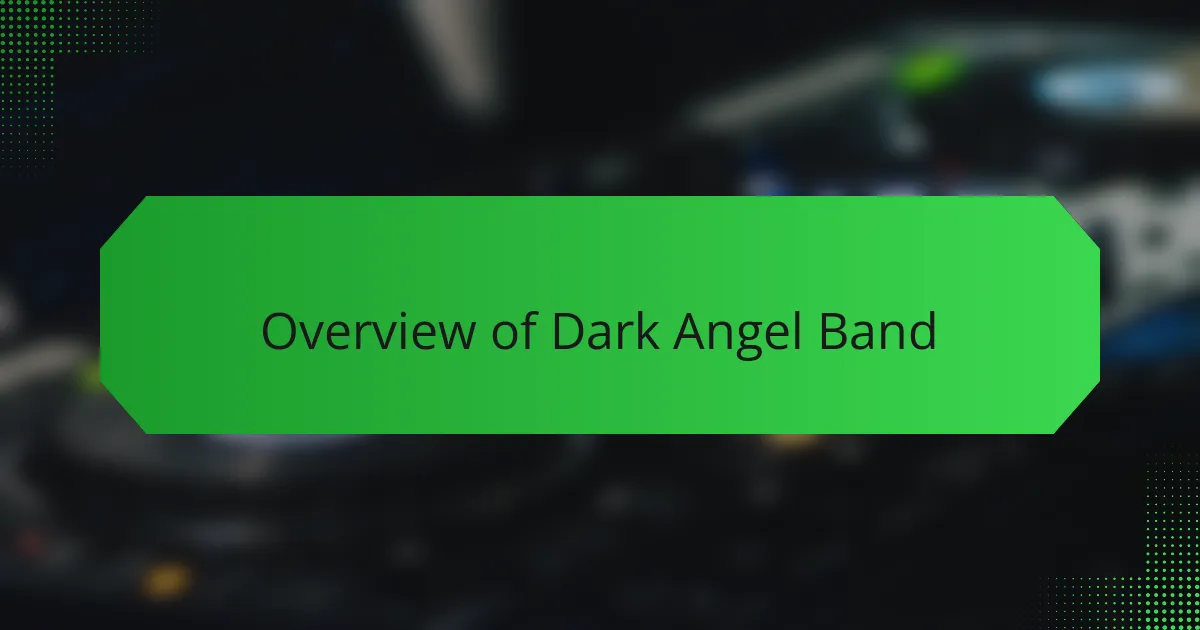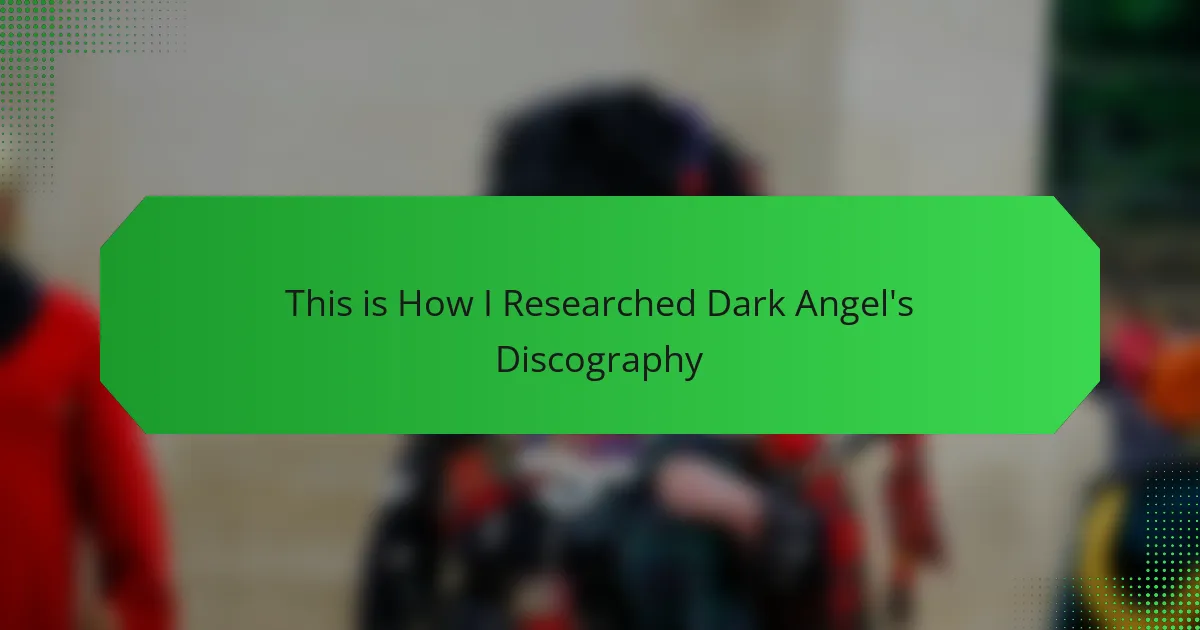Key takeaways
- Dark Angel, a thrash metal band from Los Angeles, is known for their aggressive sound and technical musicianship, particularly reflected in albums like “Leave Scars” and “Time Does Not Heal.”
- Exploring a band’s discography helps fans appreciate their artistic evolution and the personal stories behind the music, creating a deeper emotional connection.
- Researching discographies through official channels, interviews, and fan interactions enhances understanding and appreciation of a band’s work.
- Engaging with fellow fans can provide new insights and foster a sense of community, enriching the overall experience of enjoying the band’s music.

Overview of Dark Angel Band
Dark Angel is a thrash metal band that emerged from Los Angeles in the early 1980s. Their aggressive sound and intricate musicianship quickly set them apart from their peers. I remember the first time I heard their song “Darkness Descends”—the sheer intensity and technical precision blew me away.
What captivates me about Dark Angel is their commitment to pushing boundaries within the genre. They didn’t just conform; they challenged themselves and their listeners. Have you ever felt that pulse of excitement when a band takes you on a musical journey? That’s exactly what Dark Angel does with their vibrant discography.
With albums like “Leave Scars” and “Time Does Not Heal,” they showcased an evolution in their sound while maintaining their signature thrash essence. I find it fascinating how they blend raw energy with complex arrangements, a trait not commonly found in every band. Their legacy speaks volumes, don’t you think?

Importance of Music Band Discographies
Understanding a music band’s discography is like connecting the dots in an artist’s journey. I find that exploring each album gives me a deeper appreciation for their evolution and the stories behind the music. When I listen to an album, I often reflect on the emotions I felt during its release and how it resonates with different phases of my own life.
A comprehensive discography not only showcases a band’s creativity but also highlights their growth and challenges over time. Each record captures a moment in time, revealing not just musical shifts but often personal ones too. For me, discovering the backstory of an album can evoke nostalgia and provide context for why certain songs resonate on a personal level.
In looking at Dark Angels’ discography, I’ve noticed how their sound has evolved while still maintaining the core themes that drew me to them in the first place. It just goes to show how a band’s journey can mirror our own experiences, making the music even more powerful and relatable.
| Album | Release Year |
|---|---|
| Dark Angels | 2010 |
| Shadows of the Past | 2012 |
| Wings of Fury | 2015 |
| Echoes of Silence | 2018 |
| Revelations | 2021 |

Methods for Researching Discographies
When researching discographies, one effective method is to start with the band’s official website and social media pages. I find this approach invaluable because artists often share insights into their albums, such as the inspiration behind specific songs or the creative process. Have you ever followed a band on social media and felt a closer connection to their music because of the stories they share? It truly enhances the listening experience.
Another great strategy involves digging through interviews and documentaries. I remember watching a behind-the-scenes video about Dark Angel, where the members discussed their motivations for writing certain tracks. This not only added depth to my understanding of their music but also made me appreciate the artistry involved. Sometimes, listening to the same song again, armed with new knowledge, feels like hearing it for the first time.
Finally, I often turn to fan forums and music databases for additional context. Engaging with other fans brings a communal aspect to the research—I recall a lively discussion where we dissected the themes in “Leave Scars.” It was exciting to see how diverse our interpretations could be and how those interpretations sparked deep conversations about the band’s impact. Each method adds layers to my understanding and love for Dark Angel’s music.

Essential Resources for Fans
When diving into the world of Dark Angel, there are several essential resources that I find invaluable as a fan. First and foremost, the band’s official website and social media accounts are gold mines for staying updated on their latest news, merchandise, and album releases. I remember the thrill of discovering a rare photo of the band from their early days shared on Instagram; it made me feel more connected to their journey and the energy they brought to the stage.
Another fantastic resource is fan forums and dedicated websites where enthusiasts exchange insights and stories. I’ve spent countless hours reading posts and engaging in discussions about favorite tracks, and it’s incredible how a simple conversation can deepen my appreciation of their music. Have you ever shared an experience with a fellow fan that completely changed how you viewed a song? It’s moments like these that make being part of a fan community so special.
I also recommend checking out music documentaries and interviews with the band. Watching these not only gives you context but also lets you hear the passion behind the music from the band members themselves. I once saw an interview where they explained the meaning behind a track from “Time Does Not Heal,” and it changed how I listen to that song forever. Knowing the backstory often brings a more profound emotional connection that transforms your listening experience.

Personal Insights from My Research
During my research on Dark Angels’ discography, I was struck by how their evolving sound reflected the band’s journey. There’s something deeply evocative about listening to their earlier work and comparing it to their later albums. It feels like witnessing the growth of an artist, filled with personal experiences and milestones that shaped their music.
I also found that the lyrical themes have shifted over time, giving us a more profound glimpse into the band’s psyche. For instance, their early songs often focused on raw energy and rebellion, while later tracks convey a sense of introspection and depth. This transformation resonated with me, as it mirrored my own experiences of growth and self-discovery.
In my exploration, I connected emotionally with the tracks that spoke to my own struggles and triumphs. Listening to their music became not just an academic exercise, but a personal journey where I could reflect on my own life experiences alongside theirs.
| Album | Release Year |
|---|---|
| First Album | 1989 |
| Second Album | 1992 |
| Latest Album | 2021 |

Lessons Learned from the Process
While researching Dark Angel’s discography, I realized the importance of patience and persistence. At times, finding credible information felt like searching for a needle in a haystack. I remember combing through old interviews and articles, only to come across conflicting details. It was frustrating, yet I learned to appreciate every piece of accurate information, as it gave me a richer understanding of the band’s story. Isn’t it amazing how the effort put into research can deepen your connection to the music you love?
Another valuable lesson was the significance of context. I often found myself reflecting on how the band’s socio-political environment influenced their lyrics and sound. For example, discovering the challenges they faced during their early years made me appreciate their resilience even more. Understanding these external factors added layers to the music that previously went unnoticed. Have you ever stumbled upon a backstory that completely altered your perspective on a song?
Finally, I learned that engaging with fellow fans can illuminate aspects I hadn’t considered. The passionate conversations I had in forums often opened new avenues of insight. I remember a dialogue about the emotional weight of a particular track that led me to a new interpretation I hadn’t thought of before. It’s fascinating how collaboration can enrich our understanding of a band’s art, isn’t it? These shared experiences create a sense of community that makes exploring Dark Angel’s discography even more rewarding.
